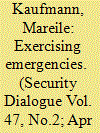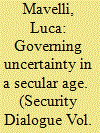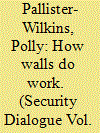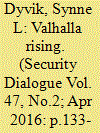|
|
|
Sort Order |
|
|
|
Items / Page
|
|
|
|
|
|
|
| Srl | Item |
| 1 |
ID:
144784


|
|
|
|
|
| Summary/Abstract |
Various reflections on the ‘Arab Spring’ evince a common view of the relationship between change and time that imbues events with a sense of intrinsic peril. Based on a framework developed from Norbert Elias’s concept of timing, this article elaborates the relationship between time and the ‘Arab Spring’ by unpacking and explaining three rhetorical tropes prevalent in academic responses to the revolts. The first two construct a problem to which the third proffers a solution. First, analysts treat time itself as a problematic force confounding stability and progress. Second, they deploy fluvial metaphors to present dynamic events as inherently insecure. Third, they use temporal Othering to retrofit the ‘Arab Spring’ to the familiar arc of liberal democracy, which renders the revolts intelligible and amenable to external intervention. These moves prioritize certainty and order over other considerations and constrain open-ended transformations within a familiar rubric of political progress. They also constitute an active timing effort based on a conservative standard, with important implications for our understanding of security and for scholarly reflexivity. The article concludes with three temporal alternatives for engaging novel changes like the ‘Arab Spring’.
|
|
|
|
|
|
|
|
|
|
|
|
|
|
|
|
| 2 |
ID:
144780


|
|
|
|
|
| Summary/Abstract |
The idea of the complex emergency has given rise to the notion of resilience as a form of acting out security. While security policies largely embrace the concept of resilience, critical scholarship points to the ‘responsibilization’ of the threatened subject, who is ‘programmed’ to act out security in a fashion that internalizes neoliberal values. This behaviour is trained through disciplinary practices, such as exercises, that seek to conduct the conduct of disaster populations. However, is the resilient subject only ever an instance of programmes and disciplinary power? This article takes a look at how self-organization comes about and how this process can be conceptualized through affect. It uses the setting of a cyber-security exercise to describe the dynamic interplay between affect and re/action. Building on Spinoza’s understanding of affect as the onset for action, the article discusses what affect theory contributes to resilience theory. It concludes that, as a form of acting out security, resilience incorporates both ‘programmed’ and ‘self-determined’ actions. Both forms of acting, however, imply that the resilient subject has no choice but to act out security. Given this fundamental restraint, powerlessness as the incapacity to act appears as one of the few instances that escape the governmental logic of resilience.
|
|
|
|
|
|
|
|
|
|
|
|
|
|
|
|
| 3 |
ID:
144781


|
|
|
|
|
| Summary/Abstract |
This article explores the problem of governing uncertainty in a secular age by focusing on the theological notion of ‘theodicy’ as the underlying rationale for the use of torture in the so-called ‘war on terror’. With God’s departure from the world, the problem of uncertainty acquires new salience as human beings can no longer explain tragic events as part of a transcendent order and must find immanent causes for the ‘evils’ that surround them. Taking a cue from Max Weber, I discuss how the problem of theodicy – how to reconcile the existence of God with the presence of evil in the world – does not disappear in the secular age but is mobilized through a Foucauldian biopolitical logic. Secular theodicy governs uncertainty through the production of economies of knowledge that rationalize processes of criminalization and securitization of entire groups and justify the use of violence. This process is particularly striking when analysing the use of torture in the so-called ‘war on terror’. Through a comparison with medieval practices and focusing on the cases of Guantanamo and Abu Ghraib, the article shows how secular torture is the product of a biopolitical theodicy aimed at governing uncertainty through the construction of the tortured as immanent evils who threaten our ‘good life’ and ‘deserve’ their treatment. Secular theodicy turns torture into an extreme form of governmentality of uncertainty in which the disciplining of conduct becomes the construction of subjectivities based on essentialist, stereotypical and racist – and for these very reasons, reassuring – economies of knowledge.
|
|
|
|
|
|
|
|
|
|
|
|
|
|
|
|
| 4 |
ID:
144783


|
|
|
|
|
| Summary/Abstract |
What do security barriers do beyond blockading or demarcating territory? This article argues for an understanding of security barriers as sociotechnical devices. It argues for a rearticulation of security barriers as more than territorial technologies or the products and producers of sovereign power. It advances the discussion of security barriers beyond what can be thought of as a ‘geopolitics of security’, where the referent object is territory, and asks that we also consider how they work with mobility as productive devices to govern people in a variety of ways. The article empirically analyses the fences of Ceuta and Melilla, the barriers of Israel’s occupation of the Palestinians, and the US counterinsurgency fence in Falluja. Building on these illustrative cases, the article argues that security barriers should be understood as products of particular modes of government and producers of particular populations through their ability to perform interruptions and capture data.
|
|
|
|
|
|
|
|
|
|
|
|
|
|
|
|
| 5 |
ID:
144782


|
|
|
|
|
| Summary/Abstract |
Recent contributions within international relations place embodiment, experience and emotion at the centre of their analysis of war. Recognizing that war should be ‘studied up from people and not down from places that sweep blood, tears and laughter away’ (Sylvester, 2012: 484), I extend this aim to analyse embodiment and experience through Norwegian military memoirs from Afghanistan. These are relevant empirically not necessarily because they contest political aims or offer policy recommendations, but because of how these embodied narratives, influenced by particular gendered conceptions of ‘warrior masculinity’ and Viking mythology, can trouble Norwegian public narratives. Through focusing on how memoirs construct the sensory experience of combat, I argue that these enable us to push conceptual understandings of embodiment and experience. Memoirs show how war is experienced as an assemblage of pleasure and pain, and how this is caught up in complex blurrings of individual and collective militarized bodies. Analysing how the pain and pleasure of war is made sense of through and between bodies allows us to advance the usage of embodiment as a concept in international relations, in turn leaving the discipline better equipped to understand war’s complex embodied assemblages.
|
|
|
|
|
|
|
|
|
|
|
|
|
|
|
|
|
|
|
|
|